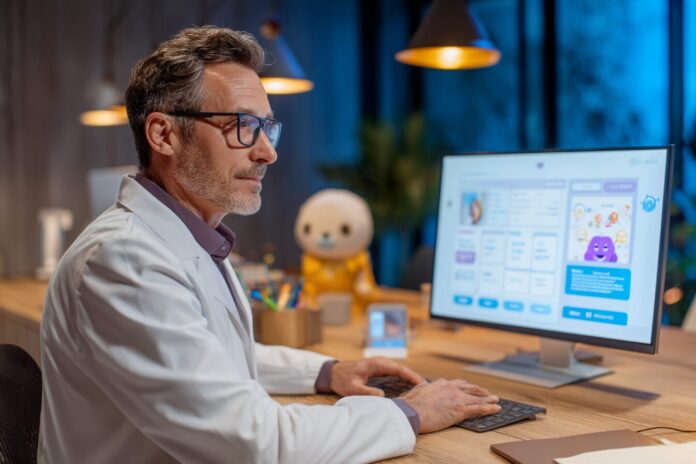The digital health landscape is evolving faster than ever, blending innovative technology with personal care. Today, two trends have captured public attention: the discreet use of artificial intelligence by therapists and the emerging role of Apple AirPods as over-the-counter hearing aids. These developments not only promise enhanced accessibility and convenience but also prompt us to scrutinize ethical boundaries, privacy concerns, and the future of wellness technology.
Most importantly, these innovations highlight a transformative era in health care where technology and human services intersect. Because digital tools are now fundamental in daily health pursuits, we must ask how much trust is placed in these unseen systems. In a continuously shifting environment, it’s essential to understand both the strengths and the risks associated with technological integrations into our personal lives.
Therapists and the Secret Use of AI
In recent years, mental health providers have incorporated AI technologies quietly into their practice. For instance, tools like ChatGPT now help with drafting session notes and summarizing patient interactions. Because many therapists choose not to disclose the use of these tools upfront, concerns over privacy and informed consent are increasingly voiced by clients.
Besides that, experts emphasize the need for transparency, especially when personal data is involved. Therapists must balance the creative power of AI with ethical obligations, ensuring that clients are well-informed about how their information is processed. This delicate balance is crucial to maintaining trust in what is already a vulnerable relationship. Therefore, honest disclosure has emerged as a key ethical standard in modern therapy practices.
The Benefits and Risks of AI-Assisted Therapy
AI therapy offers several definitive advantages. For example, these systems are available 24/7, thereby breaking down traditional barriers such as waitlists and insurance requirements. Transitioning to digital services, clients have noted a significant improvement in the personalization of care, as AI algorithms can adapt responses based on accumulated personal data.
Because of these benefits, individuals who have struggled to access mental health services find AI solutions appealing, and cost savings further democratize therapy options. However, critics underline the potential harm when sensitive data is managed by third-party platforms. Notably, privacy risks are magnified if clients are unaware of AI’s role in their treatment process. This dual-edged development works as a double-edged sword, where innovation must be balanced with strict data protection practices, as highlighted by sources such as Katie Couric Media and HealthLeaders Media.
Apple AirPods Pro 2: From Earbuds to Hearing Aids
Beyond the realm of mental health, technology is equally reshaping audiological care. Apple’s AirPods Pro 2 have officially been recognized as a viable option for individuals with mild to moderate hearing loss. This breakthrough, sanctioned by FDA clearance in September 2024, brings about a revolutionary shift in hearing aid technology by integrating advanced digital features into a familiar consumer device.
Most importantly, this innovation grants users immediate access to hearing support. Besides traditional aids, which often command high costs and carry social stigma, AirPods offer an engaging alternative. As reported by Healthy Hearing, these earbuds enhance daily auditory experiences by delivering environmental sound amplification and real-time tuning, thereby simplifying the management of hearing loss.
How AirPods Work as Hearing Aids
AirPods are now more than just wireless earbuds. They integrate sophisticated algorithms that gather acoustic data, conduct personal hearing tests, and customize audio output to individual needs. Therefore, many users, especially those who are hesitant to adopt traditional hearing aids, find AirPods a less intrusive option.
Because their design enhances convenience, these devices are easy to set up and use in everyday situations. They allow for continuous monitoring of ambient sounds, which helps in adjusting the acoustic profile without the need for frequent professional intervention. Such advancements mark a significant improvement in accessibility for people who might otherwise avoid seeking help due to cost or social stigma.
Strengths and Limitations of AirPods as Hearing Aids
One major strength of using AirPods as hearing aids is convenience. The devices are lightweight, stylish, and seamlessly integrate into your daily routine. Because they are more affordable compared to conventional hearing aids, they democratize access to auditory support. Transitioning to these devices also reduces the social stigma often associated with hearing loss, encouraging more individuals to seek help when necessary.
However, it is vital to acknowledge the limitations. AirPods are not suited for people with severe forms of hearing loss and may lack the precise adjustments offered by customized hearing aids. Besides that, clinical recommendations urge that users remain under the guidance of audiologists to monitor any progression of hearing impairment. For additional details, you might want to explore insights from the Hearing Loss Association of Florida, which outlines these potentials and constraints.
What the Future Holds
As technology continues to merge with health care, both patients and providers must remain vigilant and informed. Whether through AI-assisted therapy or novel hearing aid functions, each innovation brings its own set of responsibilities and challenges. Therefore, continued consumer education and regulatory oversight are fundamental in ensuring these technologies truly serve the public interest.
Because the integration of advanced tools like AI in therapy or AirPods as hearing aids marks a pivotal shift in care delivery, transparency and accountability become essential. Most importantly, ongoing research and patient feedback will guide the evolution of ethical practices. As seen in studies from Psychology.org and other reputable sources, informed users will help shape a future where technology supports human well-being without compromising trust.
References
- [1] Katie Couric Media – AI Therapy in 2025: Benefits, Risks, Apps
- [2] Healthy Hearing – Pros and Cons of Using Apple AirPods as Hearing Aids
- [3] Psychology.org – ChatGPT Is My Therapist: Seeking Common Ground On AI Therapy
- [4] Hearing Loss Association of Florida – AirPods as Hearing Aids: Potential Benefits and Limitations
- [5] HealthLeaders Media – Therapists are Secretly Using ChatGPT. Clients are Triggered.



